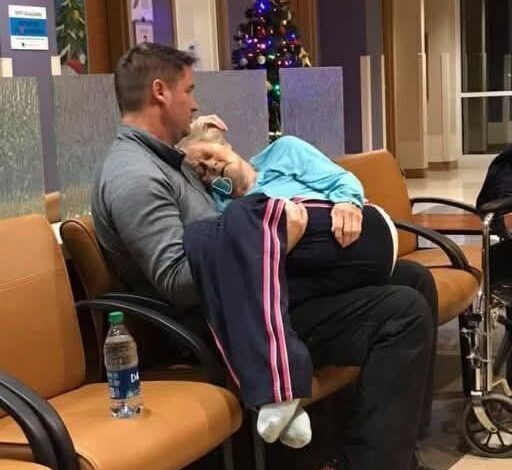The Unbreakable Bond: When Memory Fades But Love Remains Strong

In a touching display of family devotion, one grandson’s journey through the challenges of caring for an aging loved one reveals powerful lessons about connection, patience, and unconditional love.
What began as a routine medical appointment transformed into a profound experience when a simple visit extended well beyond its expected duration. After bringing his grandmother for scheduled testing, one man found himself providing comfort during an unexpectedly long five-hour wait when laboratory delays and minor health concerns extended their stay.
“She got cold, despite the comfortable room temperature,” he recalls. “I draped my jacket over her legs and offered water, but instead of responding, she simply curled against me—reminiscent of how I once sought her comfort during childhood thunderstorms.”
A passing healthcare professional observed their tender interaction, remarking on the elderly woman’s fortune in having such dedicated support. What the nurse couldn’t know was the emotional complexity behind this seemingly simple moment of care.
The grandson had been concealing a difficult truth even from close family members—his grandmother’s memory had begun failing in ways that affected her ability to recognize him. That very morning, she had mistakenly called him by his grandfather’s name, a beloved figure who had passed away fifteen years earlier. Later, she inexplicably referred to him as “Coach,” despite his never having participated in athletics.
Yet in that clinical waiting area, beneath flickering lights near a seasonal display, she embraced him with unexpected intensity, whispering words that pierced his heart: “Don’t leave me again.”
Rather than correcting her confusion, he simply returned her embrace. The overwhelming relief visible in her expression—a calmness absent for days—suggested she had finally found security in his presence.
When medical staff recommended overnight observation following inconclusive test results, her anxiety manifested in concerns about untended houseplants. Her devoted grandson remained steadfast, spending an uncomfortable night in a hospital chair, vigilantly checking on her throughout the dark hours.
Morning brought a precious moment of mental clarity when she addressed him by name with genuine recognition. “Thank you, Liam. You’re a good grandson.”
His relief was palpable. “You remember me, Grandma?”
Her smile, though faint, carried the warmth of familiarity. “Of course, I remember you. You’re my Liam.” Yet within moments, lucidity vanished as she looked beyond him, asking about a newspaper from someone long gone.
This emotional rollercoaster—brief recognition followed by confusion—characterized their new reality. The medical diagnosis confirmed what family members reluctantly acknowledged: dementia was gradually claiming the vibrant woman who had once been an anchor of stability and nurturing presence.
As weeks passed, episodes of misidentification increased. Sometimes he embodied her brother in her mind; other times, she seemed unable to perceive him at all. Yet intermittent moments of connection sustained him—a gentle hand squeeze, his name whispered with recognition, brief glimpses of her authentic personality shining through cognitive decline.
The breakthrough in understanding came unexpectedly during a rare moment of clarity when she mentioned Danny—her son who had tragically died decades earlier. The grandson finally comprehended that her confusion wasn’t merely random deterioration but rooted in profound, unresolved grief. In her declining cognitive state, he had become a surrogate for those she had loved and lost.
This revelation transformed his approach to caregiving. He stopped correcting her mistaken identifications, instead answering to whatever name she called him, listening when she spoke of her departed son, becoming whoever she needed in each moment—grandson, husband, or child—prioritizing her comfort over factual accuracy.
The most rewarding moment wasn’t a dramatic recovery but a quiet connection when she looked at him and said, “You remind me so much of Danny. He had your kind eyes.” This bittersweet observation bridged past and present, linking generations through inherited traits and enduring affection.
When she eventually passed peacefully surrounded by family, he carried forward her most important lesson: love transcends memory. Though minds may falter, hearts remember connections forged over lifetimes.
This poignant experience teaches us the value of presence, patience, and persistent love even through challenging circumstances. Sometimes the greatest gift is simply being there—listening without judgment and accepting loved ones exactly as they are in each moment. Within the confusion of cognitive decline, unexpected connections can emerge, revealing the extraordinary resilience of human bonds.
For anyone supporting family members with memory challenges, this story offers both validation and hope—a reminder that meaningful connection remains possible even when recognition fades.